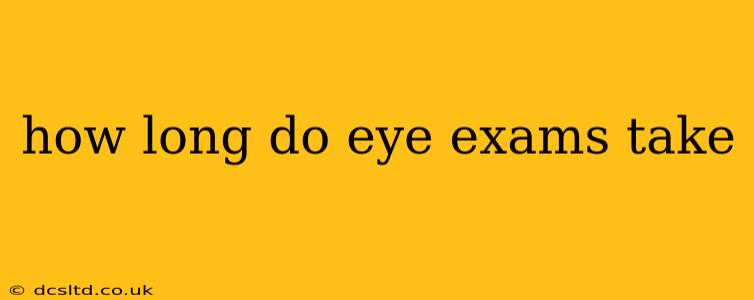Eye exams are crucial for maintaining good vision and overall eye health. But how long should you expect to spend at your optometrist's office? The answer, unfortunately, isn't a simple one. The duration of a comprehensive eye exam varies significantly depending on several factors. This guide will delve into the specifics, helping you understand what to expect during your next appointment.
What Factors Influence the Length of an Eye Exam?
Several factors contribute to the overall time commitment for an eye exam. These include:
- The type of exam: A routine eye exam for someone with good vision will naturally be shorter than a comprehensive exam for someone with pre-existing conditions or suspected vision problems. A specialized exam, such as one for glaucoma or diabetic retinopathy, will also take longer.
- Your individual needs: If you have complex vision issues or require extensive testing, the exam will take longer. Your eye doctor may need to perform additional tests to diagnose and manage your specific condition.
- The optometrist's approach: Some optometrists are more thorough than others, leading to longer exam times.
- Waiting time: Don't forget to factor in potential wait times before and after your exam. This can vary depending on the clinic's scheduling and patient volume.
What Happens During a Typical Eye Exam?
A standard eye exam typically includes the following procedures, each taking a varying amount of time:
- Visual acuity test: This tests your sharpness of vision using an eye chart, often taking around 5-10 minutes.
- Refraction test: This determines your refractive error (nearsightedness, farsightedness, astigmatism), often involving using phoropters and taking about 10-15 minutes.
- Eye muscle evaluation: Testing your eye alignment and coordination can take 5-10 minutes.
- Intraocular pressure check: Measuring the pressure inside your eyes is typically a quick process taking about 5 minutes.
- Pupil dilation (if necessary): This procedure allows your doctor a better view of the retina and can add 15-30 minutes to the exam time. The dilation effect can last for several hours.
- Retinal examination: The doctor examines the back of your eye for any abnormalities, usually taking around 10-15 minutes.
- Review and discussion: The optometrist will discuss your test results, answer your questions, and discuss any necessary treatment or follow-up appointments. This can take 10-20 minutes or longer.
How Long Does a Routine Eye Exam Take?
A routine eye exam for someone with relatively healthy eyes and no specific vision problems typically lasts between 30 and 45 minutes. However, this is just an average, and it can be shorter or longer depending on the factors mentioned above.
How Long Does a Comprehensive Eye Exam Take?
A comprehensive eye exam, which is more thorough and includes additional tests, can take significantly longer, ranging from 45 minutes to an hour or more. This type of exam is often recommended for individuals with specific concerns, risk factors for eye disease, or those over a certain age.
What if My Exam Takes Longer Than Expected?
If your exam is taking longer than anticipated, don't worry. It likely means your doctor is taking extra time to ensure an accurate diagnosis and provide you with the best possible care. Be sure to ask questions and voice any concerns you may have.
How often should I have an eye exam?
The frequency of eye exams depends on your age, overall health, and any pre-existing eye conditions. It's best to consult with your eye doctor to determine the appropriate schedule for your individual needs.
Remember, regular eye exams are crucial for early detection and treatment of various eye diseases. While the time commitment varies, the benefits far outweigh the time spent in the optometrist's chair.
